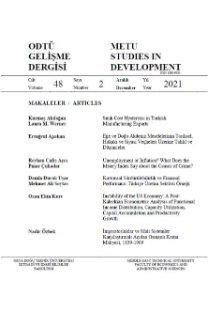Credit rating changes and the government cost of borrowing in Turkey
Standard and Poor's (S&P), Moody's ve Fitch s?irket ve devlet tahvilleri ic?in kredi notu üretmektedir. Ülke kredi derecelerinde deg?is?iklikler yatırımcıların kararlarını ve dolayısıyla devlet borc?lanma maliyetlerini etkiler. 2008 küresel finansal krizi kredi derecelendirme kurulus?ları ic?in o?nemli bir kilometre tas?ıdır c?ünkü kriz sürecinde yüksek dereceli ülkeler derin ekonomik dalgalanmalarla kars?ı kars?ıya kalmıs?lar ve bu durum kredi derecelendirme kurulus?larının güvenirlilig?ini azaltmıs?tır. Bu c?alıs?ma kriz sonrası do?nemde Türkiye'nin devlet tahvili spreadleri ile kredi notu deg?is?ikleri arasındaki ilis?kiyi incelemektedir. Temmuz 2007- Mart 2013 arasında vekto?r otoregresyon (VAR), Granger nedensellig?i, etki-tepki fonksiyonları ve olay c?alıs?ması yo?ntemleri kullanılarak Türkiye'nin kredi notlarındaki deg?is?ikliklerin spread deg?is?imleri üzerindeki etkisi incelenmis?tir. Ayrıca kredi notu deg?is?iklerinin Türkiye'nin devlet tahvili spreadleri üzerindeki dinamik etkisini incelemek ic?in olay c?alıs?ması yo?ntemi uygulanmıs?tır. Bu c?alıs?malar sonucunda kredi notu deg?is?iklerinin genellikle piyasa tarafından sezildig?ine dair kanıtlar bulunmus? olup, not deg?is?iklig?i o?ncesinde pozisyon alan yatırımcıların VAR sonuc?larında o?nemsiz sonuc?lar c?ıkmasına neden oldug?u tahmin edilmektedir
Kredı? notu deg?ı? s?ı? klı? klerı? ve Türkı? ye'nı?n devlet borc?lanma malı? yetlerı
Standard and Poor's (S&P), Moody's and Fitch have been producing credit ratings for government bonds and corporate bonds. Changes in credit ratings affect the investors' decisions and government cost of borrowing as well. 2008 global financial crisis is an important milestone for the credit rating agencies since during the crisis period high rated countries faced with deep economic fluctuations, which decreased creditworthiness of these agencies. This paper investigates the relationship between sovereign bond spreads and rating changes during the post-crisis period for Turkey. The relationship between credit rating/outlook changes and cost of borrowing in Turkey has not been investigated in an academic paper before. Therefore we perform vector autoregression (VAR) model including Granger causality test and impulse response functions (IRFs) analysis to investigate the effects of rating changes on the Turkish government bond spreads from July 2007 to March 2013. We also apply event study analysis in order to capture the dynamic effects of rating changes on Turkish government bond spreads. This analysis gives some evidences that rating announcements are often anticipated by the market so investors take their position before announcement day, which leads to insignificant results in VAR estimates
___
- AFONSO, A. (2003), "Understanding the Determinants of Sovereign Debt Rating: Evidence for the Two Leading Agencies", Journal of Economics and Finance, 27 (1), 56-74.
- AFONSO, A., GOMES, P. and FURCERI, D. (2011), "Sovereign Credit Ratings and Financial Markets Linkages Application to European Data, European Central Bank Working Papers 1347.
- AFONSO, A., GOMES, P., ROTHER, P. (2011), "Short and Long-run Determinants of Sovereign Debt Credit Ratings", International Journal of Finance and Economics, 16(1), 1-15.
- BAHENA, A. (2010), "What Role Did Credit Rating Agencies Play in the Credit Crisis?". The University of http://blogs.law.uiowa.edu/ebook/sites/default/files/Part_5_3.pdf for International Finance and Development, available at
- BDDK (2009). Finansal Piyasalar Raporu Eylül/2009:20-21.
- BISSOONDOYAL-BHEENICK, E. (2005), "An Analysis of the Determinants of Sovereign Ratings", Global Finance Journal, 15 (3), 251-280.
- CANTOR, R. and PACKER, F. (1996), "Determinants and Impact of Sovereign Credit Ratings", FRBNY Economic Policy Review, October 37-54.
- CAVALLO, E. A., POWELL, A. and RIGOBÓN, R, (2008), "Do Credit Rating Agencies Add Value? Evidence from the Sovereign Rating Business Institutions." Washington, D.C.: Inter-American Development Bank, Working Paper 674.
- COMMELLI, F. (2012), "Emerging Market Sovereign Bond Spreads: Estimation and Back-Testing", Emerging Markets Review, 13(4), 598-625.
- CSONTÓ, B. (2014), "Emerging Market Sovereign Bond Spreads and Shifts in Global Market Sentiment", Emerging Markets Review, 20, 58-74.
- ERB, C., HARVEY, C. and VISKANTA, T. (1996), "The Influence of Political, Economic and Financial Risk on Expected Fixed Income Returns", Journal of Fixed Income, 6(1), 7-31.
- FLORES, E. (2010), "Do Sovereign Credit Rating Changes Have Spillover Effects on Other Countries?". Unpublished master dissertation, Stanford University, Stanford.
- KALAYCI, Ş., DEMIR, Y. and GÖK, İ.Y. (2010), "Ülke Kredi Notunun Temel Makro Ekonomik Belirleyicileri: AB Ülkeleri ve Türkiye Üzerine Bir Reyting Arastırması", Finans Politik & Ekonomik Yorumlar. Cilt:47, Sayı:544. 15-20.
- KAMINSKY, G., and SCHMUCKLER, S. L,(2002),. "Emerging Market Instability: Do Sovereign Ratings Affect Country Risk and Stock Returns?". The World Bank Economic Review,16 (2), 171-195.
- KRÄUSSL, R. (2005), "Do Credit Rating Agencies Add to the Dynamics of Emerging Market Crises?.", Journal of Financial Stability, 1 (3), 355-385.
- LARRAIN, G., REISEN, H. and VON MALTZAN, J. (1997), Emerging Market Risk and Sovereign Credit Rating", OECD Development Centre Technical Paper 124.
- MASSON, P. (1998), "Contagion: Monsoonal Effects, Spillovers, and Jumps between Multiple Equilibria", International Monetary Fund Working Paper WP/98/142. IMF, Washington, D.C.
- REISEN, H. and VON MALTZAN, J. (1999), "Boom and Bust and Sovereign Ratings". International Finance, 2 (2), 273-293.
- REURINK, A. (2012), "Credit Rating Agencies and the Politics of Creditworthiness: the pre-Crisis Evolution and the post-Crisis Renegotiation of the Global Credit Rating Regime", University of Amsterdam.
- SCHOLTENS (1999), "On the Comovement of Bond Yield Spreads and Country Risk Ratings", Journal of Fixed Income,, 8 (4), 99-103.
- SEZGİN, F. H., ATAKAN, T. and DEĞİRMENCİ, C. (2015), "The Analysis of Economic, Financial and Political Factors Effecting The Challenges Of Ratings Assessed By The Credit Rating Agencies: A Survey For Turkey". Eurasian Econometrics, Statistics and Empirical Economics Journal, Eurasian Academy of Sciences. 1(1), 1-17 April.
- ISSN: 1010-9935
- Yayın Aralığı: Yılda 3 Sayı
- Başlangıç: 2018
- Yayıncı: ODTÜ İİBF
Sayıdaki Diğer Makaleler
Gelir hareketliliği gelir eşitsizliğini azaltabilir mi? Türkiye örneği1
AYTEKİN GÜVEN, BAŞAK DALGIÇ, Aysıt TANSEL
Credit rating changes and the government cost of borrowing in Turkey
Çin Devleti'nin reformdaki rolü: Çin endüstrisinde devam eden devlet mülkiyeti
Subcontracting and firm characteristics: Evidence from two new local industrial districts in Turkey
Dürdane Şirin SARACOĞLU, AYŞE BURÇA KIZILIRMAK YAKIŞIR
Uniqueness of the reserve price with asymmetric bidders
Hikmet GÜNAY, Xin MENG, Mark NAGELBERG
Türkiye'de yaşam memnuniyetine ilişkin mekansal bir eşitsizlik analizi
